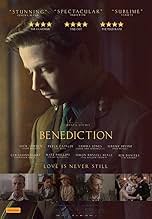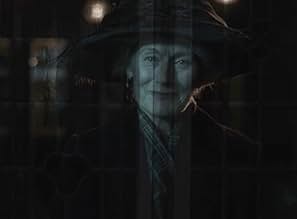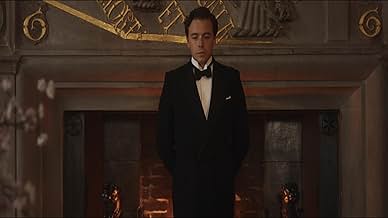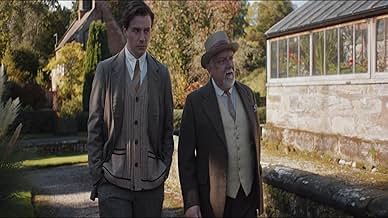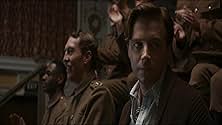Legendary 20th century English war poet Siegfried Sassoon embarks on a life-long quest for personal salvation through his experiences with family, war, his writing, and destructive relations... Read allLegendary 20th century English war poet Siegfried Sassoon embarks on a life-long quest for personal salvation through his experiences with family, war, his writing, and destructive relationships. True salvation can only come from within.Legendary 20th century English war poet Siegfried Sassoon embarks on a life-long quest for personal salvation through his experiences with family, war, his writing, and destructive relationships. True salvation can only come from within.
- Awards
- 9 wins & 19 nominations total
- Director
- Writer
- All cast & crew
- Production, box office & more at IMDbPro
Featured reviews
After the war Siegfried has a brief affair with Ivor Novello (Jeremy Irvine), shown here as the uber-bitch in London's far-from-discreet gay set. Siegfried has a longer but equally unhappy affair with upper-crust socialite Stephen Tennant (Calam Lynch), the model for Sebastian Flyte in Evelyn Waugh's BRIDESHEAD REVISITED. Unhappy with homosexual life and converting to Catholicism, Sassoon marries. Flash-forward to his later life shows Sassoon (now played by Peter Capaldi) at odds with his wife and their son.
Throughout the movie Davies inserts horrific glimpses of battle casualties which never cease to haunt Sassoon. His poems are voice-overed from time to time, although two poems of Owen's make it clear that Sassoon was somewhat Second Division in comparison.
This is a beautifully shot movie, and all the cast perfectly evoke the look and feel of the 1920s and 30s, but the scriptwriter's prevailing tone is depressing. Male lovers and a wife all fail to bring happiness to Siegfried Sassoon. A life unfulfilled; a glum movie.
In that sense, the whole film is definitely sentimental, nostalgic... and gently bitter (as oppose to bitter sweet). Even the scenes of horror from WW1 are somewhat veiled with distinctively old fashioned verses of Siegfried Sassoon. For some reason most scenes with special effects (the scene where Siegfried dropping his medal being most noteworthy) feel so dated too, as in 90's film or a student project of SiFi.
My biggest issue in enjoying the film was that I gradually lost empathy with Siegfried. He starts off as gentle, smart young man, restrained but with lucid enough self-awareness and noble idealism of a youth. Then he dips in relationships with pretty but frivolous guys, predictably gets hurt by them, and then opts for a more conventional life of marriage and child in the selfish hope that the wife and son may give him the light he craves for. And then he ends up a bitter, distant, irritable and irritating old man, who vents out to his poor wife and suffering son, practically the only people left around, for their failure to become the light he wanted them to be.
Now, it's not entirely his fault alone. The horror of the war that scarred him for life and the intolerant society that kept him from acting upon his true love have a lot to answer for. Even his shallow, egoistic post-war lovers are largely because such bold 'crazy' ones were the only people who could live somewhat openly as gay in the repressive British society.
Nevertheless Siegfried had so many privileges - his uppercrust background, artistic talent, social recognition, and few but supportive friends. Despite of it all, he makes choices against his own truth and heart, and ends up a bitter resentful old man. His last ditch attempt to God wouldn't give him the solace he craves for.
I guess that is actually the message of the film - how giving up one's true heart and truth, whether by one's own will or circumstances, can leave one just a shell of oneself. And what's the worth of a poet when he can't speak his truth?
Overall it left me somewhat unsatisfied after 2 hours of run despite of its many enjoyable and charming virtues. I suspect Terence Davies himself has never quite overcome the pessimistic view he manifested in his early trilogy.
This long film is possibly better suited for TV viewing, so for UK viewers I expect to see it on BBC TV because BBC-Films was one of the funding sources. Despite that, I'm pleased to have seen it at the almost empty cinema if only for the better focus there with no distractions of home.
I liked this more than I was expecting, which possibly says more about me than the film.
It's a surprise to me that this film got made, especially in these pandemic times, as it is quite indulgent, languid and would appeal to a possibly limited segment of cinema goers.
It is not a biography of Sassoon, as there's no mention of his father, his father's early death, the bequest from his aunt, or Heytesbury, or his death etc.
Instead it is an absorbing slightly mesmeric collage of catty dialogue, music, poetry and grainy WW1 footage and still photography artfully assembled into a tale of searching for redemption and the angst for help to deal with the past, which presumably explains the title.
The initial early transition between actors (young Siegfried and old Siegfried) could have been better handled as at least one later transition of another character was clearly done. Peter Capaldi is fabulously haunted in the role of old Siegfried, though with a clipped accent to mask the rich Scottish tones underneath. The always watchable Geraldine James appears briefly as mother.
Jeremy Irvine is devilish as Ivor Novello. Calam Lynch is acidic as young Stephen Tennant. Jack Lowden is reasonable as young Siegfried.
The first of the song choices seemed anachronistic, as the backing for grainy WW-1 footage. But this is a minor detail.
Overall: best for TV maybe, 7/10.
Did you know
- TriviaSeven of Siegfried Sassoon's poems were narrated in the film: Concert Interpretation, Died of Wounds, When I'm among a Blaze of Lights, To my Mother, To my Brother, Attack, and Invocation.
- GoofsSassoon did not discard his M.C. medal as shown in this film. He tossed away the medal's corresponding ribbon. The medal itself was inherited by Sassoon's son George.
- Quotes
Dr. Rivers: Why not?
Siegfried Sassoon: Too afraid, too inhibited. Shamed by an inner corruption. Or perhaps it's simply because of... What's the phrase? "The love that dare not speak its name."
Dr. Rivers: You are not alone in that respect.
- How long is Benediction?Powered by Alexa
Details
- Release date
- Countries of origin
- Official sites
- Languages
- Also known as
- Benediction
- Filming locations
- Chillington Hall, Port Lane, Brewood, Wolverhampton WV8 1RE, United Kingdom(Interiors and outdoor scenes)
- Production companies
- See more company credits at IMDbPro
Box office
- Gross US & Canada
- $201,093
- Opening weekend US & Canada
- $50,970
- Jun 5, 2022
- Gross worldwide
- $847,418




